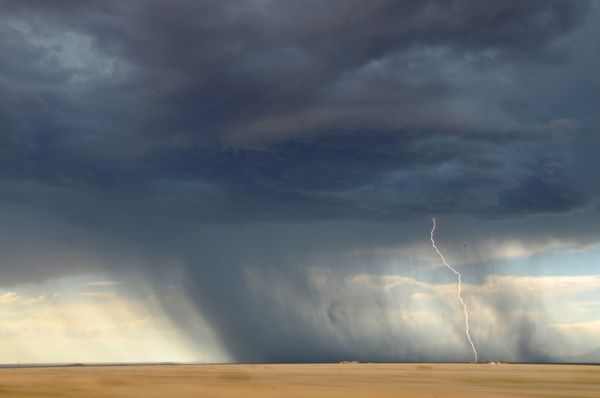Severe Weather, Severe Scams: Surviving Post-Disaster Fraud

Technological advancements have brought significant benefits, enhancing communication, commerce and convenience. However, the same advantages have brought a series of downfalls, increasing our heightened vulnerability to scams.
The proliferation of internet access and mobile devices has expanded the range of vectors exploited by threat actors to orchestrate malicious campaigns. With the ever-increasing popularity of social media, peer-to-peer payment apps and online marketplaces, scammers have accumulated a plethora of tools and platforms to exploit the good nature of unsuspecting victims.
Scams That Follow Extreme Weather
In the chaotic aftermath of severe weather phenomena like tornados, hurricanes, hailstorms, and tsunamis, the urgency for aid and repair creates fertile ground for scams.
Threat actors often exploit unfortunate scenarios to prey on their victims’ needs for quick recovery, aid, and repairs. In this guide, we will explore the scams that often emerge in the aftermath of extreme weather events, providing insights into the malicious tactics threat actors use to help you avoid falling victim to these schemes.
Understanding the methods scammers rely on and adopting preventive measures can increase your odds against these fraud attempts in the chaotic aftermath of natural disasters.
1. Home Improvement Scams
Home improvement scams typically start with scammers providing unsolicited offers, from make-believe contractors claiming to be in the area. These offers may mention work that needs to be done, like roof repairs, debris clearing, or other urgent tasks that follow an extreme weather event.
As expected, scammers resort to various techniques to entice the victim, such as offering them significant discounts or promising that the work will be done promptly at a low cost.
Once hired, scammers may demand high upfront payments, saying they need the money to buy materials. Then they either show up and do subpar work on the house or take off with the money without doing any work.
- Example:
A homeowner in a hurricane-hit area hires a contractor who claims to have some leftover materials from a nearby job. After receiving a significant deposit, the contractor disappears after doing minimal work or doesn’t even show up for the job to begin with.
Mitigation tips:
- Avoid upfront payments: Some contractors may demand large upfront payments. Instead, choose to pay in smaller installments as the work progresses.
- Be skeptical: Some contractors may exaggerate the importance of the work needed to be done, especially if your house has been affected by severe weather. A sense of urgency in the proposal could make you accept anything without pondering whether the offer seems legit.
- Written contracts: Draft a detailed written contract with the contractor you hire, specifying the work, materials and timeline.
- Verify credentials: Prioritize checking the contractor’s credentials and references. If possible, check with previous customers or look for reviews on reputable sources such as BBB.org.
2. Charity Scams
As the name implies, charity scams exploit the good nature and generosity of people who want to help others struck by tragedy.
To weaponize these unfortunate events, threat actors create fake charities, impersonate legitimate organizations, or even pose as celebrities or other trusted figures, soliciting donations through various channels, including social media, emails, or phone calls.
- Example:
After severe weather, people are contacted by rogue charities claiming to provide relief to victims. The perpetrators leverage the victims’ good nature against them, asking them to donate money quickly so they can deliver the aid right away. However, the charity is fake, and all the proceeds go straight to the scammer’s account.
Mitigation tips:
- Cross-check charities: Research the charity using reputable sources like Give.org.
- Watch out for copycats: Many threat actors disguise their charities as legitimate ones, making it harder for the untrained eye to spot rogue organizations.
- Beware of pressure tactics: Don’t succumb to pressure or other tactics the scammer may use against you to make you fold. Legitimate charities will rarely, if ever, rush you into donating.
- Direct donations: Never donate through third-party links or services. Instead, do so directly through the charity’s official website.
3. Fake Inspection Scams
In this scenario, threat actors masquerade as utility inspectors or insurance companies offering free inspections. After performing a bogus inspection, scammers often claim to have found extensive damage and offer to fix it at a discount.
Obviously, the reports are fake and used to deceive victims and steal their money. As expected, scammers also append a sense of urgency to their findings, tricking unsuspecting victims into folding under pressure and accepting the fake reparations.
- Example:
A rogue inspector contacts a recent tornado victim, offering a free roof inspection. After the bogus inspection, the “inspector” finds severe damage and pressures the homeowner into immediate repairs with a significant deposit. The alarmed victim accepts the deal, and the scammer takes the deposit and vanishes.
Mitigation tips:
- Second opinion: If your home has recently been affected by an extreme weather phenomenon, don’t haphazardly accept the first offer. Always seek a second opinion for any significant repair suggested.
- Verify inspectors: Check if the inspector is legitimate. Confirm the inspector’s identity and affiliation before allowing access to your property.
- Insurance companies: If possible, coordinate inspections through your insurance company to avoid being scammed and ensure the legitimacy of your property’s inspection.
4. Peer-to-Peer (P2P) Payment Scams
In the wake of extreme weather, people often rely on peer-to-peer (P2P) payment apps such as PayPal, Venmo, or Zelle to quickly send money for emergency repairs, temporary housing, or donations.
Scammers exploit this urgency by using fraudulent transactions to steal money or personal information.
- Example:
Victims of severe weather events may list items for sale, attempting to raise money for repairs. Scammers could overpay using stolen credit cards, then contact the seller, claiming it was a mistake, and request a refund of the excess.
The victim refunds the exceeded amount, the payment is then flagged as fraudulent, and the original amount is reversed, leaving the victim out of the item, the money, and the excess refund.
Mitigation tips:
- Trusted contacts only: Avoid transactions with people you don’t personally know and trust, especially during trying times.
- Verify requests: Always check the legitimacy of requests, especially if you receive an urgent request for funds from friends or family members. Verify the request using a separate channel (phone call, for instance) before sending any money.
- Beware the excess refund method: P2P payment apps often offer refund options. If someone contacts you about refunding an excess amount of money, suggest that they use the app’s built-in feature to handle the situation.
- Use extra security: Enable additional security options on your payment apps, such as multi-factor authentication, biometrics and PIN codes.
5. Government Impersonation Scams
In this scenario, threat actors impersonate government officials offering aid or disaster recovery grants. They collect personal information from their victims and often ask for advance fees to process the supposed aid.
However, the aid never comes, and the scammer takes away victims’ personal information or hard-earned assets.
- Example:
After a flood, victims receive calls from individuals claiming to represent the Federal Emergency Management Agency (FEMA), requesting personal information to expedite aid. This information is then used for identity theft or other types of fraud.
Mitigation tips:
- Verify calls: Use official contact information to call or message the agency directly and verify the authenticity of the calls.
- No fees: Government agencies never charge fees for processing aid applications.
- Guard personal information: Avoid sharing personal information over the phone, even if the one requesting it presents itself as a government official. Cross-check the caller’s identity and avoid oversharing personal details over the phone or online.
6. Rental and Housing Scams
After natural disasters, many families temporarily remain without shelter and seek housing. In this scenario, threat actors post fake rental listings or offer temporary housing to disaster victims.
These are often listed at low prices, enticing victims of extreme weather events to contact the lister quickly. After collecting deposits, perpetrators disappear without a trace, leaving victims without accommodation.
- Example:
A family displaced by a hurricane finds a convenient rental listing online, pays a deposit, and arrives to discover the property doesn’t exist.
Mitigation tips:
- Research listings: Verify the legitimacy of rental listings through reliable websites and visit the property in person if possible. Avoid sending deposits before actually talking to the owner, preferably face to face, and setting foot on the property.
- Secure transactions: Avoid insecure, untraceable payment methods. Many scammers prefer wire transfers or crypto transactions to cover their tracks. If the lister mentions that to you, it may indicate that the listing is a scam.
- Check reviews: If possible, look up the landlord or the property listed and check for reviews. Beware of fake reviews that are exaggeratedly positive; also, check if all the reviews are recent, as that may be a good indicator that they’re fake.
Using Specialized Software
Dedicated anti-scam software like Bitdefender Scamio can give you better odds at deterring scammers and their attempts to steal your personal data or funds. Scamio uses artificial intelligence, advanced algorithms, and machine learning to detect scams through emails, texts, messages, images, and QR codes.
Scamio can analyze donation requests, repair service offers received post-disaster, and other suspicious content, ensuring its legitimacy before any action is taken. It provides a user-friendly interface for scam detection on any device, as it can be used freely on web browsers, WhatsApp and Facebook Messenger.
You can also help others stay safe by sharing Scamio with them in France, Germany, Spain, Italy, Romania, Australia and the UK.
Conclusion
The aftermath of severe weather events creates the perfect storm for scammers to exploit vulnerable individuals. From home improvement scams to fake charity solicitations and government impersonation, threat actors are always seeking new ways to exploit victims' vulnerability and desperation.
A multi-faceted approach is critical to mitigating these risks. Individuals can better protect themselves and their loved ones by staying informed and taking proactive steps to verify the legitimacy of offers and communications.
FAQ
· How to prevent emergency scams?
Always verify the source through official channels, use trusted local services, be skeptical of unsolicited offers, ask for a second opinion, and use security tools like Scamio to check suspicious communications.
· Should I be worried if a scammer has my address?
Although it’s not ideal, a scammer can’t do much with just your address. Monitor your bank and financial accounts for suspicious or unauthorized activity, strengthen your online presence with robust passwords and multi-factor authentication, and beware of phishing attempts.
· Can a scammer track my location?
It depends on how much information you provide to the scammer. If you agree to install suspicious software on your device, a scammer may be able to use it to track your location. Limit sharing your location on social media, avoid clicking on suspicious links, and use VPN services to cloak your Internet traffic.
tags
Author
Vlad's love for technology and writing created rich soil for his interest in cybersecurity to sprout into a full-on passion. Before becoming a Security Analyst, he covered tech and security topics.
View all postsRight now Top posts
How Do You Manage Your Passwords? We Ask Netizens
December 18, 2025
Cybercriminals Use Fake Leonardo DiCaprio Film Torrent to Spread Agent Tesla Malware
December 11, 2025
FOLLOW US ON SOCIAL MEDIA
You might also like
Bookmarks









